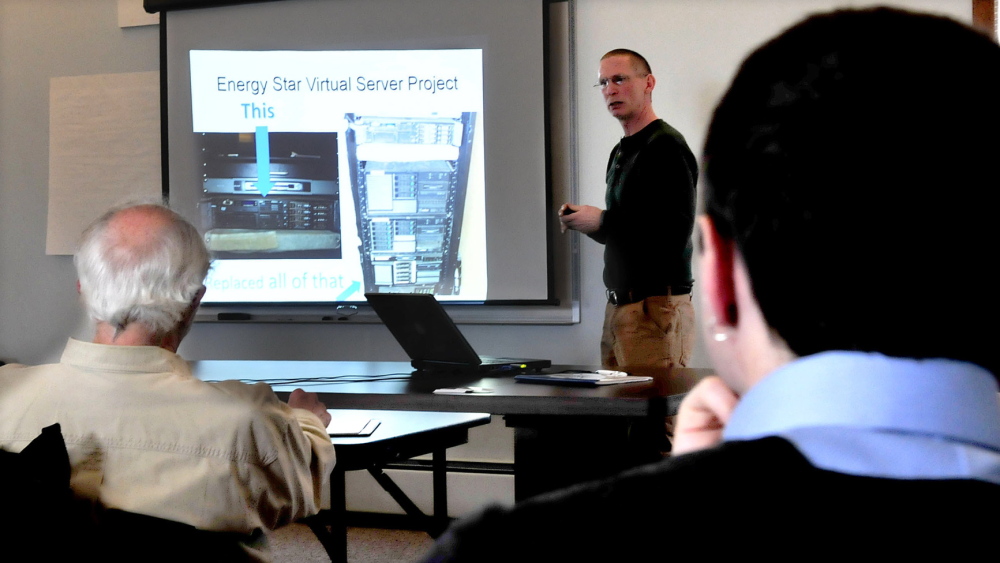A Vassalboro manufacturing company has gone “green” by banishing oil, opening the windows at night and feeding its workers fresh organic beef from a small herd of cattle raised behind the factory, the company president told a group of business leaders on Earth Day.
Tim Downing, president of Duratherm Corp. in Vassalboro, said he and his workers feel good about his mission, which he began in earnest several years ago.
“After being president of this company for 20 years, I realized I was never going to be a rich man,” Downing said. “So you begin to look for other things to motivate you.”
Duratherm, which makes wooden windows and spiral staircases, has reaped large energy savings from most of the changes he’s implemented, Downing told an audience of about 20, members of a work group that is seeking to help mid-Maine adapt to climate change.
Downing was one of several panelists at the event, held Tuesday afternoon in a conference room at the Kennebec Valley Council of Governments.
For Downing, the lightbulb moment came when he realized he could repurpose the 300 tons of wood waste generated each year by his business into a usable product.
The company’s wood chips and piles of sawdust are now compressed into briquettes.
“It was dusty, dirty mahogany wood byproduct,” he said. “It’s about a $40,000 revenue stream for our company now.”
And once his employees realized that the sawdust all around them was worth about 10 cents a pound to the company, he said, they became much more enthusiastic about sweeping it up.
“Once they make that connection to money, there’s instant buy-in,” he said. Other initiatives, such as composting and recycling, don’t have big financial payoffs, but boost worker morale and building a sense of corporate pride.
Duratherm also has benefited by replacing its oil-based heating system with wood pellet boilers, a move that not only saved him the expense of 21,000 gallons of heating oil, but also removed the hassle of the old system’s underground oil tank, which had raised repeated concerns with state environmental officers, he said.
“I’ve saving $60,000 a year in heating costs,” he said. “I heated the building this year for $12,000.”
Many of the systems Downing has introduced into the building, which was built in 1978, are familiar. He installed new insulation in the roof, energy-efficient appliances, waterless urinals that save 80,000 gallons of water per year and an LED-lighted vending machine that only comes on when employees are in the room.
Other changes have been more unusual, such as his decision to convert much of the company’s 20 acres into an organic farm, with vegetables and grass-fed Highland cattle that are used to help feed the employees.
“We process a couple of animals a year,” he said. “There’s nothing like fresh, organic meat. The employees love it.”
The company now also takes full advantage of passive heating and cooling systems. The south-facing wall is black and has a perforated face, allowing it to draw in sun-heated air to warm portions of the building.
Meanwhile, the air-conditioning system has been removed. Instead, during the warmer months, the windows are opened at night, allowing the night air to cool down the whole building. In the morning, as temperatures begin to climb, the windows are closed, trapping the cool air inside.
Some of the projects pay for themselves fairly quickly — such as a virtual server, a $13,000 investment that paid itself off in two years.
Others take longer, such as the wood pellet system, which took nearly five years, Downing said.
Downing, a former Smithfield selectman, said payback periods of more than three years often frighten off other business owners to whom he’s spoken about revamping their own systems.
“I haven’t figured that out yet,” he said. “Do you not think your business is going to be here in three years?”
For its efforts, Duratherm has been recognized or certified by a variety of independent environmental groups, including the Forest Stewardship Council, the National Fenestration Rating Council, Leadership in Energy and Environmental Design and Maine Businesses for Sustainability.
While the company has come a long way, much more would have to be done to make it completely sustainable by attaining a completely neutral or positive effect on the environment.
Geothermal wells and photovoltaic arrays would help toward that goal, but they don’t fit with the current business plan, Downing said.
“We’ve run out of low-hanging fruit, the water that was in the sponge,” he said. “We’ve done so much that we’ve benefited from, now we’re looking to grow the business as well, and that will help us get to stage three, four and five.”
Other speakers at the event included Clough Toppan, an energy auditor and consulting engineer from Vassalboro; Sam LaVallee, of ReVision Energy; and Vaughan Woodruff, owner of Insource Renewables in Pittsfield.
Matt Hongoltz-Hetling — 861-9287 mhhetling@centralmaine.com Twitter: @hh_matt
Copy the Story LinkSend questions/comments to the editors.



Success. Please wait for the page to reload. If the page does not reload within 5 seconds, please refresh the page.
Enter your email and password to access comments.
Hi, to comment on stories you must . This profile is in addition to your subscription and website login.
Already have a commenting profile? .
Invalid username/password.
Please check your email to confirm and complete your registration.
Only subscribers are eligible to post comments. Please subscribe or login first for digital access. Here’s why.
Use the form below to reset your password. When you've submitted your account email, we will send an email with a reset code.